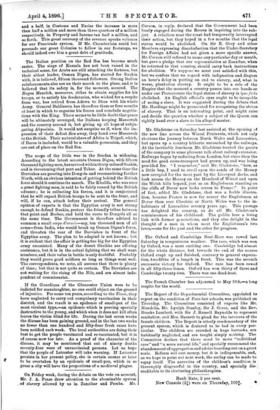On Friday week, during the debate on the vote on
account, Mr. J. A. Pease drew attention to the abominable system of slavery allowed by us in Zanzibar and Pemba. Mr. Curzon, in reply, declared that the Government had been busily engaged during the Recess in inquiring into the sub- ject. A rebellion near the coast had temporarily interrupted their action, but they hoped in a few months that the legal status would be abolished. On Sir E. Grey and other Members expressing dissatisfaction that the Under-Secretary for Foreign Affairs had not given a more specific) answer, Mr. Curzon still refused to name any particular day or month, but gave a pledge that our representative at Zanzibar, when he returned to that country, should carry back instructions for abolition. We suppose we must rest satisfied with this, but we confess that we regard with indignation and disgust an hour's delay in putting an end to slavery, and, what is worse, plantation slavery. It ought to be a rule of the Empire that the moment a country passes into our hands or under our Protectorate the legal status of slavery is ipso facto abolished. An English official's eyes ought to be incapable of seeing a slave. It was suggested during the debate that Mr. Hardinge might be prosecuted for recognising the status of slavery. That is an interesting point, and might raise and decide the question whether a subject of the Queen can rightly hand over a slave to his alleged master.


































 Previous page
Previous page